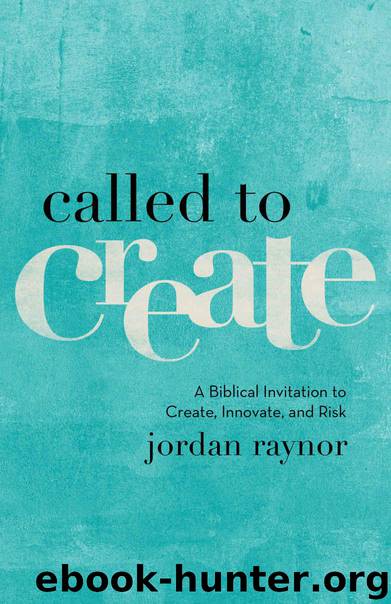Called to Create: A Biblical Invitation to Create, Innovate, and Risk by Raynor Jordan

Author:Raynor, Jordan [Raynor, Jordan]
Language: eng
Format: azw3
Tags: Christian Living/Business, REL012070, REL012090, BUS025000
ISBN: 9781493409327
Publisher: Baker Publishing Group
Published: 2017-11-06T16:00:00+00:00
Trust
In 2009, Angela Popplewell cofounded an innovative nonprofit called 100cameras, which teaches kids in marginalized communities from the Lower East Side of New York to South Sudan how to share their unique perspectives through photography. 100cameras then turns the photographs into products that are sold online, directly funding medical, educational, and lifeline supplies for the kid photographers. Like most entrepreneurs, hustling comes easily to Popplewell. But, as she has learned, when hustling is not accompanied by trusting in God, it’s natural to fool ourselves into believing that we are responsible for our success, setting up expectations we will inevitably fall short of. “There can easily be this savior-like mentality that enters in without me even knowing it,” Popplewell shared. “This mentality tells me that it’s all on me to make 100cameras work. I have to do this. The kids we support, my staff, my mentors—they all depend on me. If change is going to happen, I have to answer the call and rise up and do it. This is what makes entrepreneurship such an emotional roller coaster. When I feel like it’s all on me, I rely on my hustle, and because of that, I wear the highs way too high, and I wear the lows way too low.”
I can’t think of a more apt term to describe this common thinking than “savior-like mentality.” When we hustle and fail to recognize God as our ultimate provider, we are essentially trying to save ourselves, trying to prove to the world that we don’t need a savior, that we can accomplish anything we set our minds to in our own strength.
Nicole Baker Fulgham, another nonprofit entrepreneur, knows this struggle all too well. Growing up in a working-class neighborhood in Detroit, Fulgham had a front-row seat to the problem of education inequality. Fortunately for her, Fulgham was accepted into an “exam high school” outside of her neighborhood where one hundred percent of the kids graduated and went on to college. This opportunity put Fulgham on a path to earning a bachelor’s degree from the University of Michigan and a PhD in education policy from UCLA. But the other kids in Fulgham’s neighborhood weren’t as fortunate. “All of my friends on my block went to the neighborhood high school, where half of the students didn’t graduate,” Fulgham said to me. “I remember thinking, ‘Wait a minute, the kids in my neighborhood are just as smart as I am. Why isn’t anyone trying to help them succeed?’”
A fire had been kindled in Fulgham to help solve the problem of education inequality in America, sparked in part by her church community. “I went to an African American church every Sunday where there was a tradition of social justice and putting your faith into action,” she said. After receiving her degrees from two top schools, Fulgham knew it was time to put her faith into action, a faith that, as the title of her book suggests, is concerned with Educating All God’s Children. This led Fulgham to
Download
This site does not store any files on its server. We only index and link to content provided by other sites. Please contact the content providers to delete copyright contents if any and email us, we'll remove relevant links or contents immediately.
The 5 Love Languages: The Secret to Love That Lasts by Gary Chapman(9768)
The Space Between by Michelle L. Teichman(6921)
Assassin’s Fate by Robin Hobb(6192)
Wiseguy by Nicholas Pileggi(5762)
Everything Happens for a Reason by Kate Bowler(4729)
Gerald's Game by Stephen King(4631)
Pillow Thoughts by Courtney Peppernell(4268)
A Simplified Life by Emily Ley(4155)
The Power of Positive Thinking by Norman Vincent Peale(4053)
Harry Potter and the Prisoner of Azkaban (Book 3) by J. K. Rowling(3346)
Resisting Happiness by Matthew Kelly(3332)
Girl, Wash Your Face by Rachel Hollis(3273)
Being Aware of Being Aware by Rupert Spira(3266)
The Code Book by Simon Singh(3167)
The Secret Power of Speaking God's Word by Joyce Meyer(3154)
More Language of Letting Go: 366 New Daily Meditations by Melody Beattie(3017)
Real Sex by Lauren F. Winner(3002)
Name Book, The: Over 10,000 Names--Their Meanings, Origins, and Spiritual Significance by Astoria Dorothy(2967)
The Holy Spirit by Billy Graham(2938)
